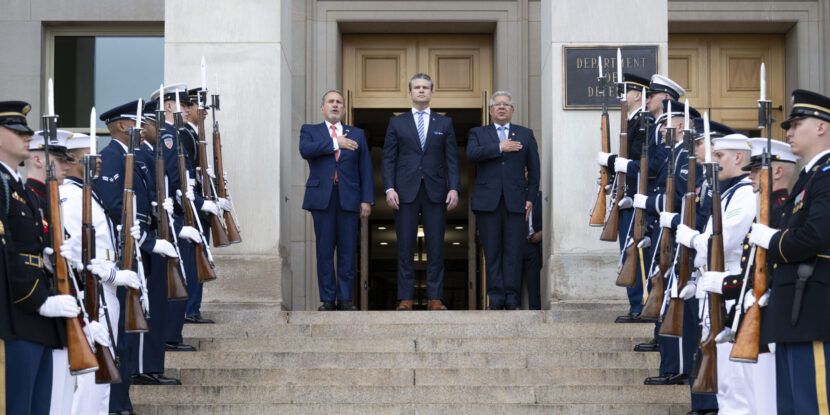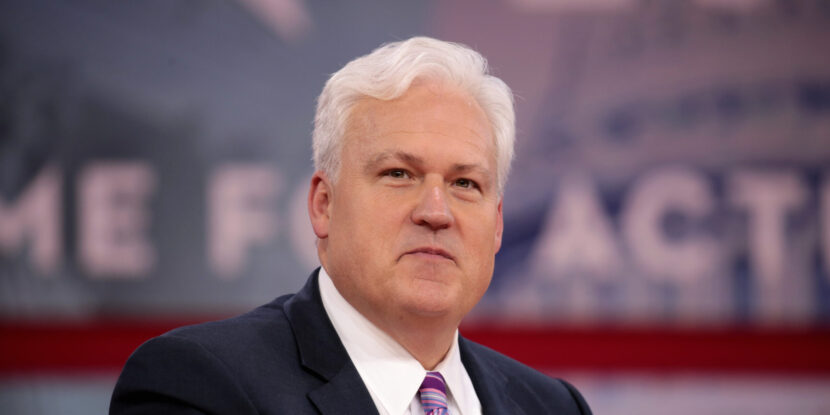
PULSE POINTS:
❓What Happened: Secretary of Defense Pete Hegseth says the Pentagon will begin reducing administrative bloat, refocusing the Defense Department on warfighters and military readiness, starting with a 20 percent reduction in the number of four-star generals and admirals.
👥 Who’s Involved: Secretary of Defense Pete Hegseth, President Donald J. Trump, the Pentagon, senior military officials.
Your free, daily feed from The National Pulse.
📍 Where & When: Monday, May 5, 2025.
💬 Key Quote: “We won World War II with seven four-star generals. Today we have 44. Do all of those directly contribute to warfighting success? Maybe they do—I don’t know—but it’s worth reviewing to make sure they do,” Hegseth said at a town hall earlier this year.
⚠️ Impact: The reforms are aimed at cutting administrative bloat in U.S. defense and refocusing efforts towards warfighters and military readiness, building a leaner and more prepared military.
IN FULL:
President Donald J. Trump‘s Secretary of Defense, Pete Hegseth, says the Pentagon will begin reducing administrative bloat, refocusing the Defense Department on warfighters and military readiness. As part of the first stage of this process, Hegseth announced late Monday that the U.S. military will reduce its number of four-star generals and admirals, aiming to cut senior staff by an estimated 20 percent. Additionally, Hegesth is directing the National Guard to reduce the number of general officers by 20 percent and to cut another 10 percent of all flag and general officers.
In the memo directing the cuts, Hegseth argues that in order to “drive innovation and operational excellence,” the U.S. military must be “unencumbered by unnecessary bureaucratic layers that hinder their growth and effectiveness.” He explained that part of the plan to achieve this goal requires “removing redundant force structure to optimize and streamline leadership by reducing excess general and flag officer positions.”
The Defense Secretary, announcing the senior officer reductions in a post on X (formerly Twitter), stated: “We’re going to shift resources from bloated headquarters elements to our warfighters.”
Pentagon critics have long pointed to the department’s top-heavy bloat, with senior leaders behaving more like politicians than commanders, with some not having seen combat in decades. “We won World War II with seven four-star generals. Today we have 44,” Hegseth said in February, adding: “Do all of those directly contribute to warfighting success? Maybe they do—I don’t know—but it’s worth reviewing to make sure they do.”

PULSE POINTS:
❓What Happened: A Virginia judge acquitted former Conservative Political Action Conference (CPAC) finance director Ryan McGowan of wrongdoing in a $14,000 payout dispute, rejecting claims he overpaid departing staffers’ unused vacation time.
👥 Who’s Involved: Ryan McGowan, Alexandria Circuit Court Judge Kathleen Uston, CPAC executive Lynne Rasmussen, former CPAC general counsel David Safavian, former executive director Dan Schneider, and CPAC chairman Matt Schlapp.
Your free, daily feed from The National Pulse.
📍 Where & When: Alexandria Circuit Court, Alexandria, Virginia, May 6, 2025.
⚠️ Impact: The ruling exposes CPAC leadership’s inconsistencies, potentially weakening its influence while strengthening McGowan’s rival conservative group amid ongoing fallout from the Schlapp scandal.
IN FULL:
A Virginia court has cleared former Conservative Political Action Conference (CPAC) finance director Ryan McGowan of allegations he improperly paid $14,000 in unused vacation time to five departing staffers, delivering a sharp rebuke to the Matt Schlapp-led outfit. The decision, handed down in Alexandria Circuit Court, highlights internal dysfunction at CPAC, which has also been rocked by homosexual scandals involving Schlapp for years.
Judge Kathleen Uston, in a 30-minute evidence review, pointed to glaring contradictions in the testimony of CPAC executive Lynne Rasmussen and former general counsel David Safavian.
Rasmussen claimed she emailed staff about a paid time off (PTO) limit but failed to produce the emails, and a text exchange showed her asking McGowan’s deputy for a 15 percent salary increase while keeping McGowan in the dark—contradicting her testimony that the deputy lacked such authority. The judge also noted the frustration of the Alexandria detective investigating the case, who was blindsided by details Rasmussen withheld.
The case, long followed by The National Pulse, was more to do with Schlapp pursuing a vendetta at those he perceived to undermine his leadership than any actual wrongdoing.
McGowan’s new conservative group, which grades lawmakers, has also drawn CPAC’s ire, though a civil suit against them was dismissed earlier this year.
Testimony also revealed McGowan had flagged a $50,000 legal bill CPAC paid for Schlapp during the scandal, reigniting scrutiny of Schlapp’s leadership.
CPAC and its parent organization, the American Conservative Union (ACU), has now shelled out vast swathes of donor cash, staff time, and attracted mountains of negative publicity as a result of Schlapp’s numerous escapades.
For years, The National Pulse has been at the forefront of exposing the corruption inside the organization, including contributions from Soros-linked groupsSoros-linked groups, as well as extreme financial improprieties.
The organization is now a shell of its former self, once hosting the largest annual conservative conference, now relegated to an afterthought.
show less

 1 month ago
4
1 month ago
4








 English (US) ·
English (US) ·